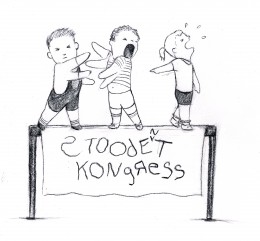
We elect our student representatives, both in the Student Congress and as members of the Student Association Executive Board, to work for us, the students. They dedicate countless hours each week to running programs and drafting, debating and voting upon legislation to make our lives better.
Except when they don’t. Sometimes, our student government leaders spend three hours arguing with themselves.
Last night marked the longest meeting of the Student Congress all semester, and one of the longest meetings any member can ever remember attending. Those three hours were not spent debating bus routes and dining hall prices. The Congress and E-Board spent those hours arguing about why two separate members of the E-Board should be censured, or formally reprimanded, before deciding not to censure either one.
Why not censure Derrick Conyers, the vice president for academic affairs, and Ravi Prakriya, the vice president for finance (VPF)?
The first, and simplest, answer is that it wouldn’t matter anyway. Censuring has no real, relevant consequences other than publicly degrading someone’s reputation, which was theoretically the reason that Conyers staged his own censure. The censure legislation alleged that Conyers had not submitted the report that his office, like every E-Board office, is supposed to submit for each Congress meeting. This offense is grounds for censuring, which Conyers was certainly aware of, given that he was censured for the same thing at the last Student Congress meeting. Conyers intentionally did not submit his report in order to get himself censured again, to point out how silly the process is because it bears no real consequences.
And how did the Student Congress respond? They spent nearly 45 minutes debating whether or not Conyers should be suspended from his position for a week. This exchange was absurd on a number of levels. First, the Student Congress doesn’t have the authority to suspend anyone. It isn’t a real punishment. This fact was acknowledged by Vice Speaker Andrew Henry, the loudest and most desk-banging proponent of the suspension, after it was voted down. Had they voted to suspend Conyers for a week, the decision would have just been deemed unconstitutional by the Judicial Board. It was a symbolic gesture to reprimand someone for making a symbolic gesture to prove how ineffective the Student Congress is.
That sound you are hearing is the Pipe Dream Editorial Board collectively banging their heads against a wall.
And what if they had suspended Conyers? What would that have accomplished? All it would have done is slow down the Office of Academic Affairs for a week. The best way to tell someone that he needs to start doing his job is to make it harder for him to do his job for a week. Right?
This, of course, says nothing of the last hour of the meeting, which was devoted to arguing about why Prakriya should also be censured, despite everyone acknowledging that censuring was useless merely hours earlier.
Prakriya did not submit a report that his office was supposed to submit. According to Student Association President Eric Larson, no VPF has ever submitted this report.
From what we can tell, Student Congress and the E-Board are in some kind of feedback loop/circle jerk where they make rules for themselves, which they then break, and then argue for hours about what should happen to members who break those self-made rules. Meanwhile, there is a student body of approximately 16,000, who have real needs and concerns that need addressing.
If these reports are not important, then why are they required? If they are important, why don’t people write them? Either way, there must be some way for the E-Board to resolve this issue without wasting everyone’s time arguing about it.
Let’s be realistic here. The average Binghamton University undergraduate doesn’t really give a damn if Derrick Conyers or Ravi Prakriya are in office or not. They need things to run smoothly, but they don’t much care who is running them. These fights are almost entirely internal, and they take away from the legitimacy of the body, whose main objective should be working for the students, not spending hours fighting like children over bureaucracy.
Of course, there are still good things being done by Congress. This meeting, Samson Widerman, the executive vice president, introduced legislation to make it easier for people to donate money directly to the Student Association, and Chris Zamlout, the chair of the Internal Affairs Committee, introduced legislation to make it easier for student groups to get meals catered for potlucks without Sodexo stepping in. These legitimate efforts to actually help the student body were eclipsed and trivialized by the unnecessary and immature in-fighting among E-Board members.
Clearly, some reforms need to take place. The Congress needs to be given better oversight capabilities and better enforcement to police the E-Board. E-Board members need to put aside petty complaints and do their jobs. Or don’t, but don’t spend hours arguing about it just because SA elections are coming up.
Overall, the meeting was unprofessional and riddled with inefficiencies. Frustrating, but hey, at least there was Nirchi’s.


